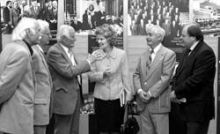September 20, the Vernadsky National Library of Ukraine witnessed the ceremony of opening an exhibit commemorating the 30th anniversary of the signing of the Final Act of the Conference on Security and Cooperation in Europe. The organizers, the Finnish embassy in Ukraine and the National Library, succeeded in turning what was outwardly an event of little public interest, offering a closer look at the history of European diplomacy, into an exciting excursion. For example, the exhibit offers information about collisions dating back 30 years, when guests were accommodated in accordance with the English or French alphabet (several years ago, the participants in the NATO summit in Prague were seated at the table in accordance with the French alphabet, lest the US and UK leaders have to rub elbows with Leonid Kuchma).
The first meeting of the series that resulted in the signing of the Final Helsinki Act, August 1, 1975, was called to order in the Finnish capital, July 3, 1973. Addressing the participants in the third meeting, President of Finland Urho Kekkonen said that there was every reason to believe that they had all embarked on a road leading to stability and solid peace. The Final Act became a long-term program of construction for a united and democratic Europe. Since 1995, the CSCE has been known as OSCE. Ukraine has been taking part in its work since 1992. Last year, OSCE called into question the turnout of the second round of the presidential elections in Ukraine. In addition, owing to OSCE’s close following of election campaigns in the post- Soviet space, some CIS countries, above all Russia, are saying it is necessary to reform OSCE because this organization does not want to put up with the idea of “controllable democracy.”
The exposition offers documents reflecting OSCE activities, literature about Finland, unique ancient maps. In keeping with European standards, one will be able to familiarize oneself with an electronic version of this exhibit on the National Library’s Web site.







